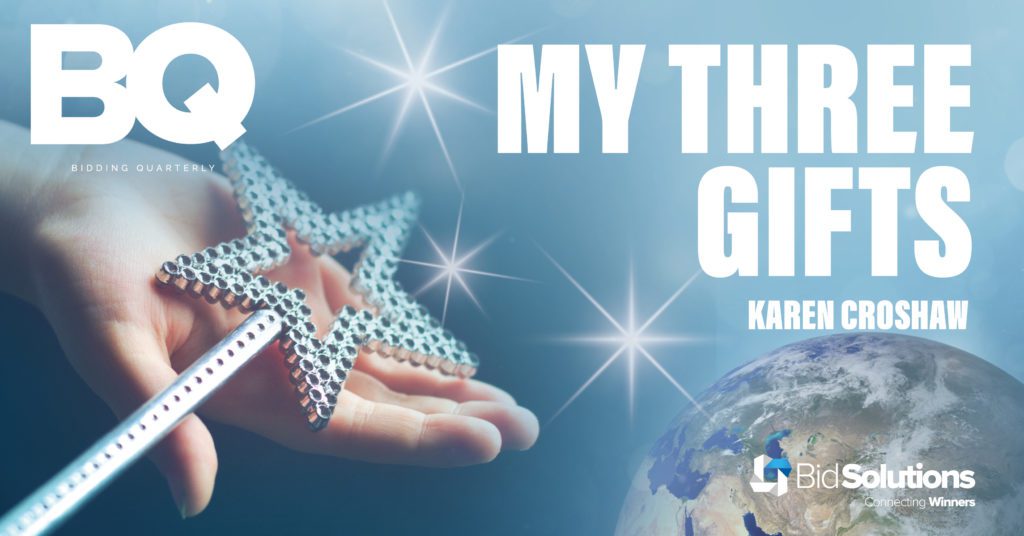
The pandemic has taught us we can run successful bids with a geographically dispersed bid team. I have no doubt this trend will continue, with “You’re on mute, mate!” winning the award for “Most Frequently Used Phrase of 2022” as it has done for the previous two years.
Now that we’ve all embraced Teams, Zoom and Sharepoint as tools to help us collaborate, international bids will become a breeze, right? Wrong. Whilst we might assimilate technology quickly, the cultural aspects of international bidding don’t change that fast.
I’m sharing three things I learned the hard way and wish I’d known before I started working on an overseas bid.
My Three Gifts
Gift 1: Relationships are everything.
Good business transactions are based on trust: we only want to do business with people we like and trust. Even before the tender was published, our local in-country business development teams had invested significant resources in building strong relationships with our overseas clients.
We also knew local suppliers and carried out our due diligence, because we were committed to working in that country. By the time the procurement was launched, the client was expecting our tender. From that point, the procurement became a competition on a level playing field because all bidders understood exactly what the client wanted to achieve, and the challenges involved.
In my first offshore bid I was 100% UK-based, unable to get a Saudi Arabian visa. I couldn’t build as good a relationship with my in-country bid team as I would have liked. In addition, the bandwidth was weak, video conferencing was prohibited, and the phone signal vanished in bad weather.
So what? If you haven’t invested resource in building a relationship with your client, contributed to the scope of the ITT or have anyone based in-country, then don’t bid. If you are the bid manager and this hasn’t formed part of your bid/no bid, then push back on the bid decision. If, on the other hand, you are a serious contender and you have an in-country team, then as bid manager try and meet them in person early to build relationships and trust.
Gift 2: Baksheesh.
At the bid kick-off for my first Gulf tender, one of my Saudi-based colleagues asked me what my “Brown Envelope Budget” was. I was horrified, having understood it meant a budget for paying in-country bribes and backhanders to get our tender favourably reviewed. I explained our Anti-Bribery and Corruption (ABC) Policy and that we did not buy work. I could hear him laughing to himself as he said, “Well you won’t win the bid like that!” However, we stood by our ABC policy and won the tender openly and transparently. My client did ask me after contract award when his signing gift (a white Range Rover with personalised number plates) was arriving, and I laughed and gave him a branded pen instead. It was similar – it was white with a logo on the side.
Whilst baksheesh is a cultural norm with some overseas public sector organisations, it can land British companies in trouble with the Serious Fraud Office.
So what? Has the expectation to pay bribes formed part of your bid/no bid? If not, then push back on the decision to bid. If it’s been considered and agreed, then have a strong and clear ABC policy right from the start of the bid. Make sure your entire bid team is aware of it (including in-country teams) and stick by it. Does your ABC policy mean you are unlikely to be successful? Will it change your decision to bid? Can you win and deliver without paying bribes?
Gift 3: “Don’t They Know It’s Friday?”
Time and weekend differences can massively affect your bid if not managed well. When I managed my first Middle East bid, weekends in Saudi Arabia, the UAE and the UK were all different. Time differences and daylight savings time meant that, at best, I had a maximum of 12 hours in a working week when I could get contributors all together on a conference call.
When Saudi changed the weekend to fit in with the rest of the Gulf, this made managing the dispersed team easier. To ensure we made sufficient bid progress, I adjusted my own working week to match the UAE week – starting work on Sundays 5am UK time, to maximise my contact with the Gulf team. However, the bid team was still expected to attend meetings and be available between 9 and 5 Monday to Friday. This expectation only changed once I based myself in the UAE for the next bid and experienced first-hand the local team’s frustration. I declined yet another Friday evening meeting request and suggested we reconvene at 7am UAE time on Sunday instead – which suited 80% of the bid team. I got an explosive call from the UK asking if I really meant a meeting at 3 o’clock on a Sunday morning – how ridiculous was that? I replied that it was as ridiculous as expecting people to attend a conference call at 10pm in the middle of their weekend.
So what? To get results, you’ll need to understand and respect the local day: the weekend, the dates of cultural and religious holidays, when your bid team starts and finishes work. Build the consideration of what the local day looks like into your bid planning and scheduling. For example, a Gulf team and public sector clients are likely to work shorter hours during Ramadan but with clever planning, the Gulf weekend is an opportunity to gain a 6-day working week for your bid team. I’ve found it essential to have an accountable in-country bid manager/coordinator for each location to manage local activity and local stakeholders, UK included.
Summary: I could go on forever, and I’m happy for you to contact me to discuss, but for your next offshore or geographically dispersed bid, my three gifts to you are:
One: Build local relationships
Two: Be clear on corruption
Three: Respect the local day
This article was written by Karen Croshaw.
Karen has been involved in bidding and tendering for nearly 25 years, firstly with universities and training providers, then in large private sector organisations. She now runs her own successful freelance bid consultancy. Her consulting career spans public and private sector bids including government frameworks, nuclear, rail, road, construction, digital, defence, healthcare and skills. She has strong Middle East bid/project delivery experience gained by living and working in the UEA, Saudi Arabia and Oman, where she also trained and qualified as a scuba instructor.

